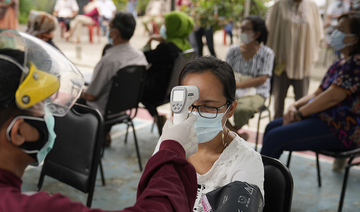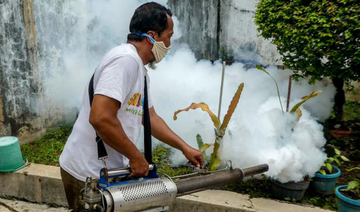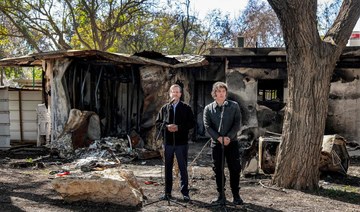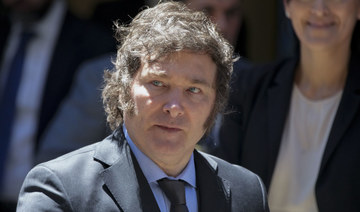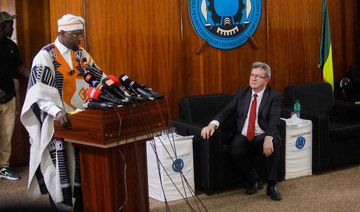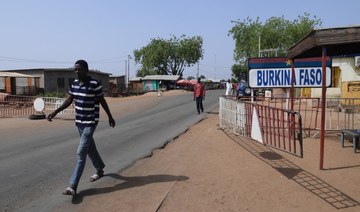JAKARTA: Indonesia grappled with a surge in COVID-19 cases on Monday, losing 30 doctors to the disease in nearly a month, amid a surge in infections which health officials predicted would occur after millions flouted health protocols during the Eid Al-Fitr holiday in May.
So far, 57,561 people have lost their lives to coronavirus since the start of the pandemic last year, including 423 on Monday, according to official data.
Among the total fatalities are 405 doctors, and hundreds of healthcare workers at the front line of the pandemic, while hospitals and community health centers continue to be overloaded with patients.
“Four more doctors died today due to COVID-19,” Dr. Adib Khumaidi, head of the Indonesian medical doctors’ association (IDI) mitigation team, told reporters on Sunday. “That brings the total number of doctors who died in June to 30.”
Infections are spiking across Java, Indonesia’s most populated island, with Khumaidi saying they were also receiving reports from across the country.
He added that in the Kudus regency of Central Java, 853 doctors had been exposed to the disease and 231 were being treated, while five doctors were in a critical condition after being exposed to COVID-19 in East Java.
Yogyakarta and Jakarta – two special regions in Java – are also among areas where doctors had died after being infected with the virus, he said.
The pandemic has also taken a toll on nurses and healthcare professionals in the country, where the ratio of physicians per population is 0.4 per 1,000, according to a 2018 World Bank report.
According to Nursalam, a professor in nursing at Airlangga University in Surabaya, the provincial capital of East Java, at least 277 healthcare professionals in the province had succumbed to the disease, out of which 177 were nurses, including nine who died in June.
“Almost all of them have been vaccinated, but they were still exposed to the disease,” Nursalam told Arab News on Monday.
He cited several factors, including a weak immune system, comorbidities, and health workers dealing with patients exposed to the delta variant, especially Indonesian migrant workers who returned home to Bangkalan, a regency in East Java on the western side of Madura Island near Surabaya, where clusters of locally transmitted coronavirus emerged after the Eid holiday.
As of June 21, the number of healthcare professionals who had been fully vaccinated stood at 1,405,320 or almost 100 percent of the target population, according to official data.
Khumaidi said the grim numbers should act as a warning to the government to take drastic steps to prevent a collapse at the downstream level of the pandemic response.
“It is imperative to ensure optimal protection of health workers to reduce the burden to the health system,” the World Health Organization said in its weekly report on Indonesia issued on June 23.
Khumaidi acknowledged that clips on social media showing patients waiting outside hospital parking lots or in emergency tents portrayed the real situation.
“Those clips that went viral showed the factual condition on the ground,” he said.
On Friday, Health Minister Budi Gunadi Sadikin said that three major hospitals in Jakarta had been fully converted to treat COVID-19 patients, while five towers at a low-cost apartment complex in East Jakarta could accommodate asymptomatic patients who needed to self isolate as the Kemayoran Athlete’s Village emergency hospital was also full.
Sadikin also said the government was adding more beds, including 7,000 in Jakarta, and deploying more healthcare workers in regions where cases had spiked.
“But adding more beds and nurses would be meaningless if the number of patients continues to rise because people keep flouting health protocols. We need more stringent and stricter measures to control the outbreak,” Nursalam said.
During Sunday’s press conference, the medical association repeated its call to the government for the imposition of large-scale social restrictions simultaneously across Java for at least two weeks.
“The authorities must ensure that the restrictions are fully implemented to ensure its maximum result,” Khumaidi said.
In its June 23 report, the WHO also highlighted that “stricter implementation of public health and social measures including large-scale social restrictions may help.”
The government, however, is adamant that tightened micro curbs remain the best option.
“The government has decided that the micro scale public activities restrictions remains the best policy to curb the spread of the COVID-19 down to the village level, or the root of the problem at the community level,” President Joko Widodo said on June 23. “(Large-scale) lockdown and the micro curbs are essentially the same, to restrict public activities. There is no need to contradict them. We should be able to control the exponent rise of cases if the micro curbs are well implemented.”




